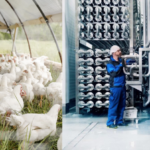“I am more optimistic than pessimistic”, says Jim Tørresen, Professor of Robotics and Intelligent Systems research group at UiO, about the long-term future of artificial intelligence and its benefits for humanity.
Firstly, can you explain to me how a machine can think?
– Thinking requires the ability to apply earlier acquired knowledge in choosing the best conclusion or action for the task at hand. We can emulate this process in machines by having them making models learned by using examples of knowledge related to either sensing, reasoning and/or behavior.
Automation is already replacing many jobs, from bank tellers to taxi drivers in the near future. Is it time to think about making laws to protect some of these industries?
– The progress of autonomous systems being deployed has historically been slower than that many futurists tend to indicate. Further, the technology has so far mostly generated more new jobs than it has taken away. It has also provided us with tools to make it possible to do jobs with less effort and requiring less competence and skill. Thus, technology can be a scheme for being competitive even for high-cost countries. Further, technology would make it possible for less educated people doing advanced jobs with the help of technology. Therefore, in the future many of us would need to work less, and the number of people unemployed would depend on how the work remaining is distributed in the population. This could partly be up governments to regulate.
Is it a problem if AI can predict what we´re going to do?
– It all depends on how it is applied. The prediction capability would have benefits that make us work faster like when we type text messages on our phone, and it suggests what words we plan to write when we type the first characters. The potential problems would probably be related to AI prediction taking unwanted control or if knowledge about us is misused by others.
Where will AI be in five-to-ten years?
– This is really hard to tell. What is expected to be big quickly doesn’t often happen to come true, and what is regarded as minor may grow really big. The smartphone is probably one example of the latter. It has really impacted both how we work and interact. A possible big change in society would be when autonomous cars start being in widespread use. It will easily take at least ten years although the technology is to a large extent in place although not yet for winter condition in Norway.


Why are humans so fascinated with robots?
– They have appeared in numerous movies and on TV for many years. Humanoid robot research tries to mimic the human and people are probably eager to see if that would eventually be possible or not.
Can they fulfil human needs that other human’s can´t?
– They can do some tasks potentially better than humans like being reliable, accurate and persistent. However, they would not substitute the emotional side of humans including social contact. However, the technology can in the future help e.g. elderly in making contact with other people easier through interaction over Internet and autonomously bringing people out to visit and see friends.
What are the limits (if any) to human-robot interaction?
– It would probably be possible to emulate most human capabilities in a robot but the Turing test has shown that getting a robot to interact with text or speech as a human is really hard.
How do we decide what is uniquely human? What is uniquely robotic?
– I would regard consciousness is uniquely human, that is, having knowledge about oneself. On the other hand, any parts of a robot can be substituted so its existence on earth may in principle be infinitely.
What are the biggest ethical issues facing roboticists today?
– I think a major one is to decide how much autonomy a robot should be given and to what extent various autonomous systems together should be able to take decisions without a human in the loop. However, this is not only up to the designers to decide but also up to be politicians to regulate.
How plausible is human-like artificial intelligence, such as the kind often seen in films and TV?
– It gets more plausible as the technology development is progressing within multiple domains like computer hardware and software, mechanical material properties and more compact and effective power sources.
Should we be making AI that behaves like humans?
– Not necessarily. Technology is much present to make our work and life easier. Whether it behaves or looks like a human is not as important as how well it does what we want it to do for us.
How do cyborgs differ (technically or conceptually) from A.I.?
– The envisaged cyborg is a being combining a machine and organic material while AI can also be applied to other domains than robotics and robots consisting of mechanical parts only.
“AI would help making technology less visible rather than more visible”
Are you generally optimistic or pessimistic about the long-term future of artificial intelligence and its benefits for humanity?
– I´m more optimistic than pessimistic. AI allows for technology adapting to the user rather than requiring the user to adapt to fixed technology as we are used. Thus, AI would help making technology less visible rather than more visible since it would better understand our needs and intentions. In general, I´m optimistic but I think protecting systems against misuse and not too quickly taking the human out of the loop in interacting autonomous systems would be important for AI not being harmful to humankind.









